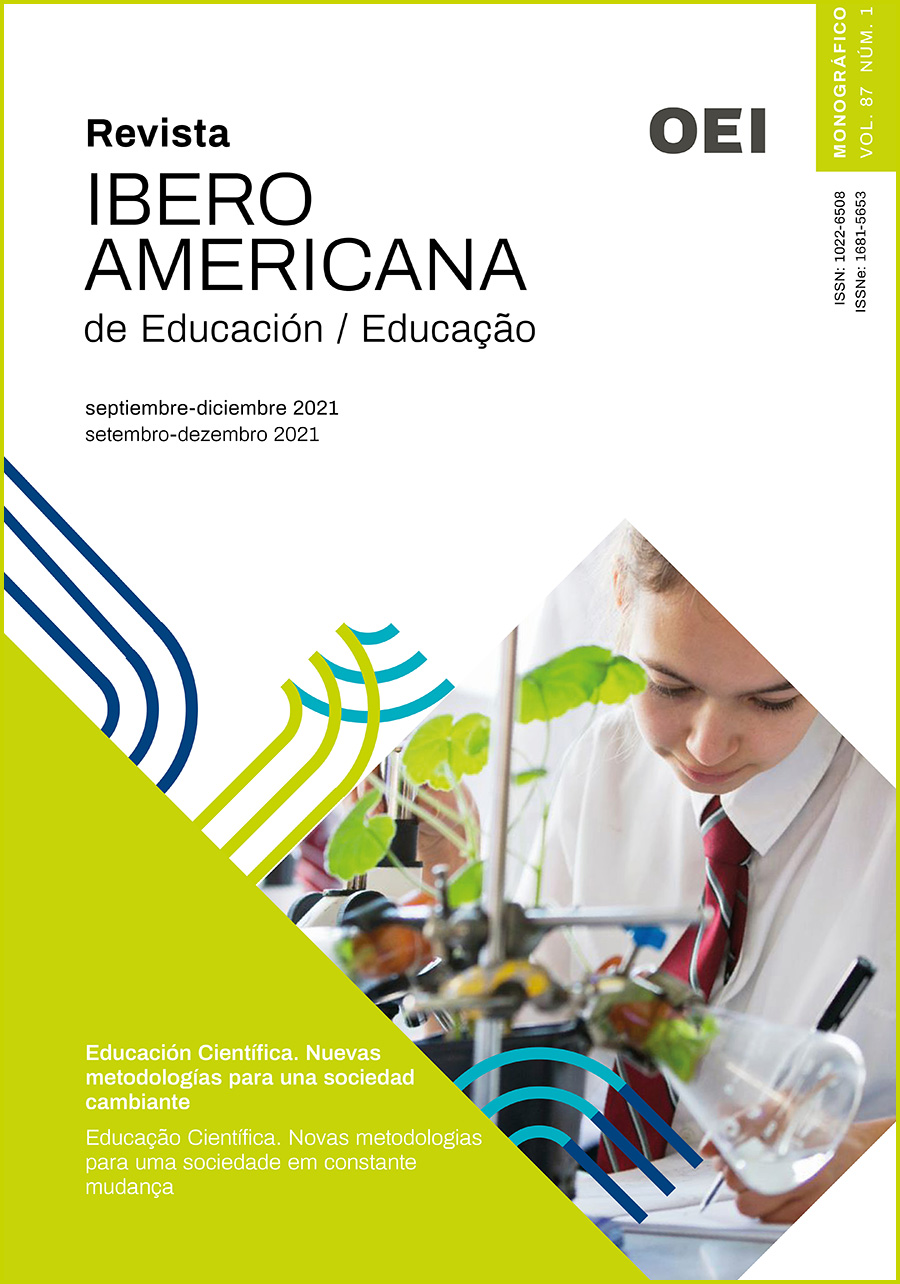We are being invaded. Discussing scientific concepts related to covid-19 pandemic through the development of memes
DOI:
https://doi.org/10.35362/rie8714579Keywords:
multimodality, high school, digital culture, innovative methodologiesAbstract
In the teaching and learning process in Science, multimodal language is essential, and the multimodal meme genre shows this hybrid language in students’ communicative interactions. In order to value this type of social practice as a resource in innovative methodologies, this research aimed to investigate how the development of memes enables the identification of students’ prior knowledge about the COVID-19 pandemic, through the use of multimodal language. In this qualitative research, data were constructed in Biology classes with the participation of 136 high school student. As a result, students created 221 memes involving the multimodal language. These memes were analyzed and categorized considering their communicational purpose: information memes (n=62), social criticism memes (n=77) and entertainment memes (n=82). The students’ prior knowledge covered issues such as the need to adopt prophylactic measures to avoid contagion, virus mutations, remote teaching, and understanding of the importance of the vaccination process with direct criticism of the Brazilian government. The protagonism of students in the elaboration of memes about the COVID-19 pandemic evidenced their creative capacity, communication and critical reflection through the elaboration of multimodal texts.
Downloads
References
Albuquerque, T. C. C. (2018). Uma imagem vale mais com mil palavras: estudo sobre a produção de textos multimodais para o ensino do conceito de respiração pulmonar. 186 f. Tese (Doutorado em Ensino das Ciências e Matemática) – Universidade Federal Rural de Pernambuco. Pernambuco, Recife.
Andersen, K. G., Rambaut, A., Lipkin, W. I., Holmes, E. C. & Garry, R. F. (2020). The proximal origin of SARS-CoV-2. Nature Medicine, 26, 450–452. https://doi.org/10.1038/s41591-020-0820-9.
Barcelos, T. do N, Muniz, L. N., Dantas, D. M., Cotrim Junior, D. F., Cavalcante, J. R., & Faerstein, E. (2021). Analise de fake news veiculadas durante a pandemia de covid-19 no Brasil. Revista Panamericana de Salud Publica, 4. https://doi.org/10.26633/RPSP.2021.65G.
Bardin, L. (2011). Análise de conteúdo. São Paulo: Edições 70.
Basch, C. H., Hillyer, G. C. & Jaime, C. (2020). COVID-19 on TikTok: harnessing na emerging social media platform to convey importante public health messages. International Journal of Adolescent Medicine and Health. https://doi.org/10.1515/ijamh-2020-0111.
Bautista, J. B., Ciannella, D. & Struchiner, M. (2020). Adolescência em memes: análise das representações de alunos do ensino fundamental. Revista Exitus, 10, 1-31. https://doi.org/10.24065/2237-9460.2020v10n1ID1214.
Bezerra, A. C. V., Silva, C. E. M., Soares, F. R. G. & Silva, J. A. M. (2020). Fatores associados ao comportamento da população durante o isolamento social na pandemia de COVID-19. Ciência e saúde Coletiva, 25(suplem. 1), 2411-2421. https://doi.org/10.1590/1413-81232020256.1.10792020.
Bortolazzo, S. (2016). O imperativo da cultura digital: entre novas tecnologias e estudos culturais. Cadernos de Comunicação, 20(1). https://doi.org/10.5902/2316882X22133.
Calil, G. G. (2021). A negação da pandemia: reflexões sobre a estratégia bolsonarista. Serv. Soc. Soc. 140, 30-47. http://dx.doi.org/10.1590/0101-6628.232.
Carvalho, A. G. de. (2020). O não verbal na leitura de memes no ensino-aprendizagem de espanhol como língua adicional. Revista (entre parênteses), 9(1). https://doi.org/10.32988/rep.v1n9.1133.
Costa, J. S. & Carneiro-Leão, A. M. dos A. (2020). Campanha sanitária e educação em ciências para a saúde: construção de sentidos sobre impresso para o combate a transmissão não vetorial do zika vírus. Ensaio Pesquisa em Educação em Ciências, 22(1). https://doi.org/10.1590/1983-21172020210131
Dawkins, R. (2007). O Gene Egoísta. São Paulo: Companhia das Letras.
Dynel, M. (2021). COVID-19 memes going viral: On the multiple multimodal voices behind face masks. Discourse & Society, 32(2), 175–195. https://doi.org/10.1177/0957926520970385.
Felcher, C. D. O. & Folmer, V. (2018). A criação de memes pelos estudantes: uma possibilidade para aprender matemática. Revista Tecnologias na Educação, 10(25).
Godoy, A. S. (1995). Pesquisa qualitativa: tipos fundamentais, Rev. adm. empres., 33(5), 20-29 https://doi.org/10.1590/S0034-75901995000300004
Gonçalves, P. G. F. (2016). Memes e educação matemática: um olhar para as redes digitais. Anais do Encontro Nacional de Educação Matemática, São Paulo, SP, Brasil.
Kress, G. & Van Leeuwen, T. (2006). Reading images: the gramar of visual design. London, New York: Routledge.
Lara, M. T. de A. & Mendonca, M. C. (2020). O meme em material didático: considerações sobre ensino/aprendizagem de gêneros do discurso. Bakhtiniana, Rev. Estud. Discurso, 15(2), 185-209. https://doi.org/10.1590/2176-457342169.
Latgé, P. K., Araujo, D. N. & Junior, A. G. S. (2020). Comunicação, educação e vigilância em saúde em tempos de COVID-19: a experiência das comunidades de Niterói, RJ. APS em revista, 2(2), 122-127. https://doi.org/10.14295/aps.v2i2.110.
Leal-Toledo, G. (2013). Em busca de uma fundamentação para a Memética. Trans/Form/Ação, 36(1), 187-210. http://dx.doi.org/10.1590/S0101-31732013000100011.
Lucena, R. C. B. (2018). Educanvisa: considerações para a análise no contexto da política brasileira. In.: Lacerda, E. & Hexsel, R. (Orgs.). Educação em vigilância sanitária. Brasília: Agência Nacional de Vigilância Sanitária, pp. 54-58.
Marcushi, A. L. (2005). Gêneros textuais & ensino. 4ª ed. Rio de Janeiro: Lucerna.
Martino, L. M. S. & Grohmann, R. (2017). A longa duração dos memes no ambiente digital: um estudo a partir de quatro geradores de imagens online. Revista fronteiras – estudos midiáticos, 19(1), pp. 94-101. https://doi.org/10.4013/fem.2017.191.09.
Nadanovsky, P. P. (2021). Como interpretar os benefícios das vacinas contra covid-19?. Informe ENSP, Fiocruz, recuperado em 12 de maio, 2021 de https://www.arca.fiocruz.br/handle/icict/46811.
Oliveira, F. V., Candito, V., Guerra, L & Chitolina, M. R. (2020). Aprendizagem baseada em problemas por meio da temática coronavírus: uma proposta para ensino de química. Interfaces Científicas, 10(1), 110–123. https://doi.org/10.17564/2316-3828.2020v10n1p110-123.
Palácio, M. A. V. & Takenami, I. (2020). Em tempos de pandemia pela COVID-19: o desafio para a educação em saúde. Vigil. Sanit. Debate, 8(2), 10-15. https://doi.org/10.22239/2317-269x.01530.
Silva, D. L. S. (2019). Os memes como suporte pedagógico no ensino de história. Periferia, 11(1), 162-178. https://doi.org/10.12957/periferia.2019.36408.
UFF (2020). Museu de Memes. coLAB / Instituto Nacional de Ciência e Tecnologia em Democracia Digital - Universidad Federal Fluminense. https://museudememes.com.br/
Valla, V. V. (2006). Controle social ou controle público?. In.: De Seta, M. H., Pepe, V. L. E. & Oliveira, G. O. de. (Orgs.). Gestão e vigilância sanitária: modos atuais do pensar e fazer. (cap.3, pp. 49-60). Brasil: Editora da Fundação Oswaldo Cruz.
How to Cite
Published
Issue
Section
License
Any authors who publish with this journal accept the following terms:















